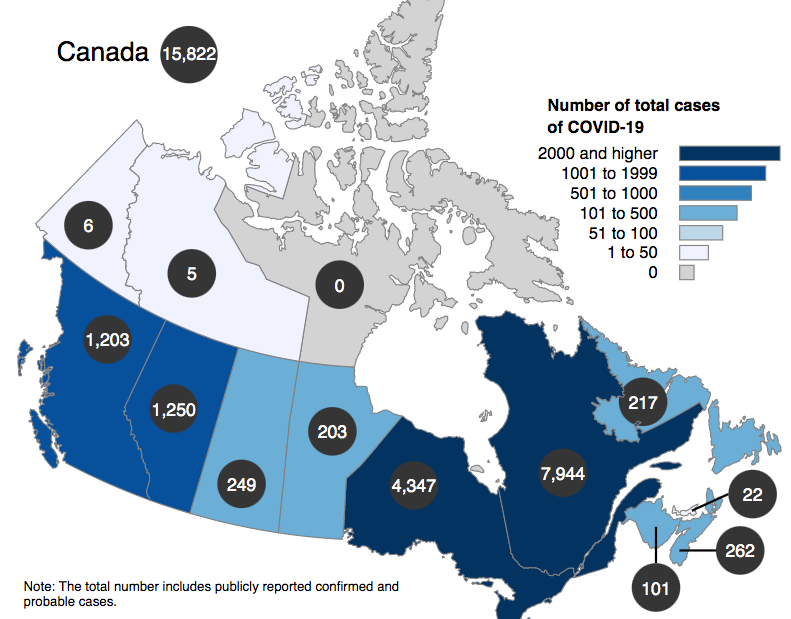Manitoba announced only one new case of COVID-19 April 6, bringing the provincial total to 204.
Of those 204 cases there are 11 currently in hospital, seven of them in intensive care. Two people who tested positive for the virus have died while 17 have recovered.
The number of cases in the Northern Regional Health Authority area remains at two. Although Manitoba public health officials do not disclose the location of COVID-19 cases by community, one of them is believed to be a woman in Flin Flon whose family posted on Facebook that she had tested positive for the coronavirus.
Nisichawayasihk Cree Nation (NCN) Chief Marcel Moody said in an update on the First Nation’s website April 3 that there was a case in Thompson but this remains unconfirmed. The City of Thompson said in a Facebook post April 4 that it didn’t have any information beyond that released by the provincial government but that it was likely the virus would arrive here if it hadn’t already.
“Residents should have and continue to behave as if community transmission is possible,” said the city’s update.
Churchill-Keewatinook Aski NDP MP Niki Ashton said the province should do more than identify the region a confirmed case is in.
“We need to know which communities in the north have confirmed cases,” she said April 6. “This is a matter of public health. People are already anxious. The guessing game that ensues after we know of a confirmed case is something that creates more anxiety. We should simply have our province state where the cases are.”
Roussin said April 6 that wearing non-medical masks may help prevent people who don’t have symptoms from spreading the virus but that it would not do much to prevent them from contracting it.
He also said people in First Nations and Northern Manitoba who attend testing sites after having been directed there by Health Links staff can receive a test even if they haven’t travelled recently.
“If you’re mildly ill and without any underlying risk factors, my advice would be just to stay home,” said Roussin. “If people with symptoms attend in a First Nation community, in the north, they will be eligible for testing for COVID-19.”
He said First Nations and remote communities are considered, along with other places like congregate settings such as prisons or jails, to be eligible for prioritized samples.
Ashton said she welcomed expanded testing and would like to see the criteria broadened even more.
“This should have been done earlier and we need to go further than people who are symptomatic,” Ashton said. “We know that there is growing research about how asymptomatic people who may have been in contact with a confirmed case can also spread the virus. This something tha’ts been taken seriously by jurisdictions, including Germany, who do a lot of testing.”
Manitoba’s chief nursing officer Lanette Siragusa said the fact that health care operations in Thompson rely on itinerant workers from outside the city and the province could pose a problem if more health care workers start testing positive for COVID-19 or showing symptoms and are unable to work.
“That’s always a risk that we’re going to have to deal with,” she said. “It could be a problem. What we’re looking at is making sure we can support the sites to maintain operations. That may mean looking at different staffing models, which we don’t usually do in normal times, but these are not normal times so there’s work going on to look at what would that be and then also really being able to support virtually. In Winnipeg, a lot of the ambulatory clinics have decreased. About 80 per cent of them are not seeing people in person anymore, they’re seeing them virtually and they’re offering virtual support to their colleagues in rural and Northern Manitoba so if they need an internal medicine consult there is a way to access a specialist and it may be virtually but it’s still expert advice and support and if a transfer’s required we will make it happen.”
Manitoba Premier Brian Pallister said April 3 that the province had issued a request for proposals for temporary low-acuity hospitals in Winnipeg, Brandon and Thompson.
Siragusa also said that any decision about whether to open a temporary hospital would depend on the volume of patients and their needs.
“That may be patients who could typically go home but maybe the home environment’s not ready for them or maybe they need home care but the services are limited because of the situation we’re in.,” she said, explaining who low-acuity hospitals would be for. “That would be really a place to transition back home to the community and so I guess it would depend on the level of service that is required. I can’t really predict how fast that’s going to happen and exactly when but we will be monitoring every day. We’re planning in advance and we will make decisions as we need to to expand space.”
An isolation centre for people who tested positive for COVID-19 or have been exposed to a known case has already been established and opened in a Winnipeg hotel.
About 13,500 people have been tested for the coronavirus in Manitoba as of April 5.
As of April 6, there were 15,822 probable or confirmed vases of the coronavirus in Canada and 293 people had died, including 62 people in the previous 24 hours.
Any person concerned about their exposure to or risk of having COVID-19 should call Health Links–Info Santé at 204-788-8200 or toll-free at 1-888-315-9257 to be screened to see if a test is required.




